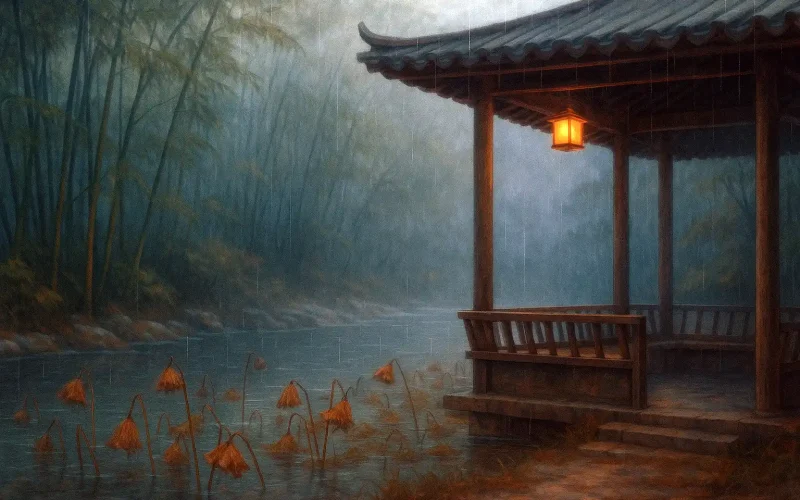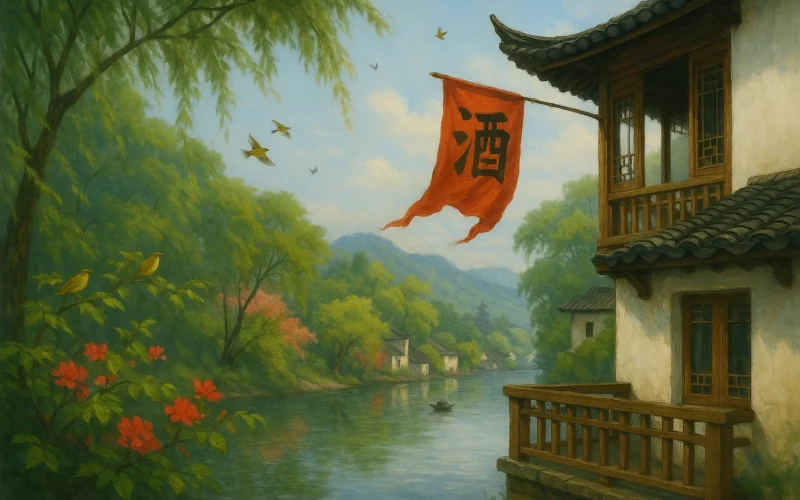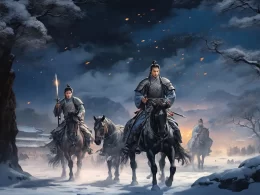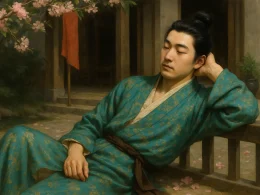In the bamboo grove by the clean poolside I stay;
Separated from you by towns, I miss you far away.
The autumn gloom undispersed and late frost remain;
Only the withered lotus listen to the rain.
Original Poem
「宿骆氏亭寄怀崔雍崔衮」
李商隐
竹坞无尘水槛清,相思迢递隔重城。
秋阴不散霜飞晚,留得枯荷听雨声。
Interpretation
Composed in 835 AD (the eighth year of Taihe era), this poem was written when Li Shangyin, having departed from the Cui family, lodged temporarily in the garden pavilion of a Luo family. As a traveler in a strange land, the poet nostalgically recalls his cousins Cui Yong and Cui Gun, while simultaneously revealing his own solitude. Through serene landscape depictions, the poem expresses both longing for friends and lamentation of rootless existence.
First Couplet: "竹坞无尘水槛清,相思迢递隔重城。"
Zhú wù wú chén shuǐ kǎn qīng, xiāngsī tiáodì gé chóng chéng.
The bamboo grove - dustless; the waterside rail - clear, Yet my yearning crosses walled towns far and near.
The pristine bamboo enclosure (竹坞) and crystalline waterside (水槛清) establish monastic purity, their very clarity amplifying the poet's solitude. "Walled towns far and near" (隔重城) spatializes emotional distance, where each city wall represents another layer of separation between the poet and his beloved cousins. The couplet's structural contrast - immaculate near scenery versus inaccessible distant relationships - encapsulates the exile's paradox.
Second Couplet: "秋阴不散霜飞晚,留得枯荷听雨声。"
Qiū yīn bù sàn shuāng fēi wǎn, liú dé kū hé tīng yǔ shēng.
Autumn's gloom lingers, frost delays its flight, Only withered lotus remains to hear rain's night.
Meteorological suspension ("gloom lingers," "frost delays") mirrors the poet's emotional stasis. The aesthetic alchemy occurs in the second line - the "withered lotus" (枯荷), traditionally symbolizing decay, undergoes transfiguration through auditory grace ("hear rain's night"), becoming nature's melancholic instrument. This paradox where decrepitude enables beauty reflects the poet's own exile as a condition for artistic creation.
Holistic Appreciation
The poem constructs a spiritual topography where physical environments become psychological correlatives. The progression from visual purity (first couplet) to auditory revelation (second couplet) traces the poet's journey from spatial awareness to temporal acceptance. The "withered lotus" epiphany demonstrates Li Shangyin's signature transformative vision - finding lyrical potential in abandonment, making aesthetic virtue of existential necessity.
Artistic Merits
- Sensory Alchemy: Transmutes visual decay (withered lotus) into auditory elegance (rain's rhythm)
- Architectonic Contrast: Juxtaposes horizontal separation (walled cities) with vertical connection (rainfall)
- Temporal Suspension: The delayed frost and lingering gloom create a chronotope of emotional liminality
Insights
This autumnal meditation reveals how artistic perception can redeem existential isolation. The poet's ability to derive aesthetic consolation from barrenness (lotus) and obstruction (walls) models a creative response to adversity. Modern readers may recognize here a Tang dynasty precursor to existentialist thought - how meaning is not found but made, even through life's withered remnants. The poem ultimately suggests that true connection transcends physical separation when transformed into artistic communion.
Poem translator
Xu Yuan-chong (许渊冲)
About the poet
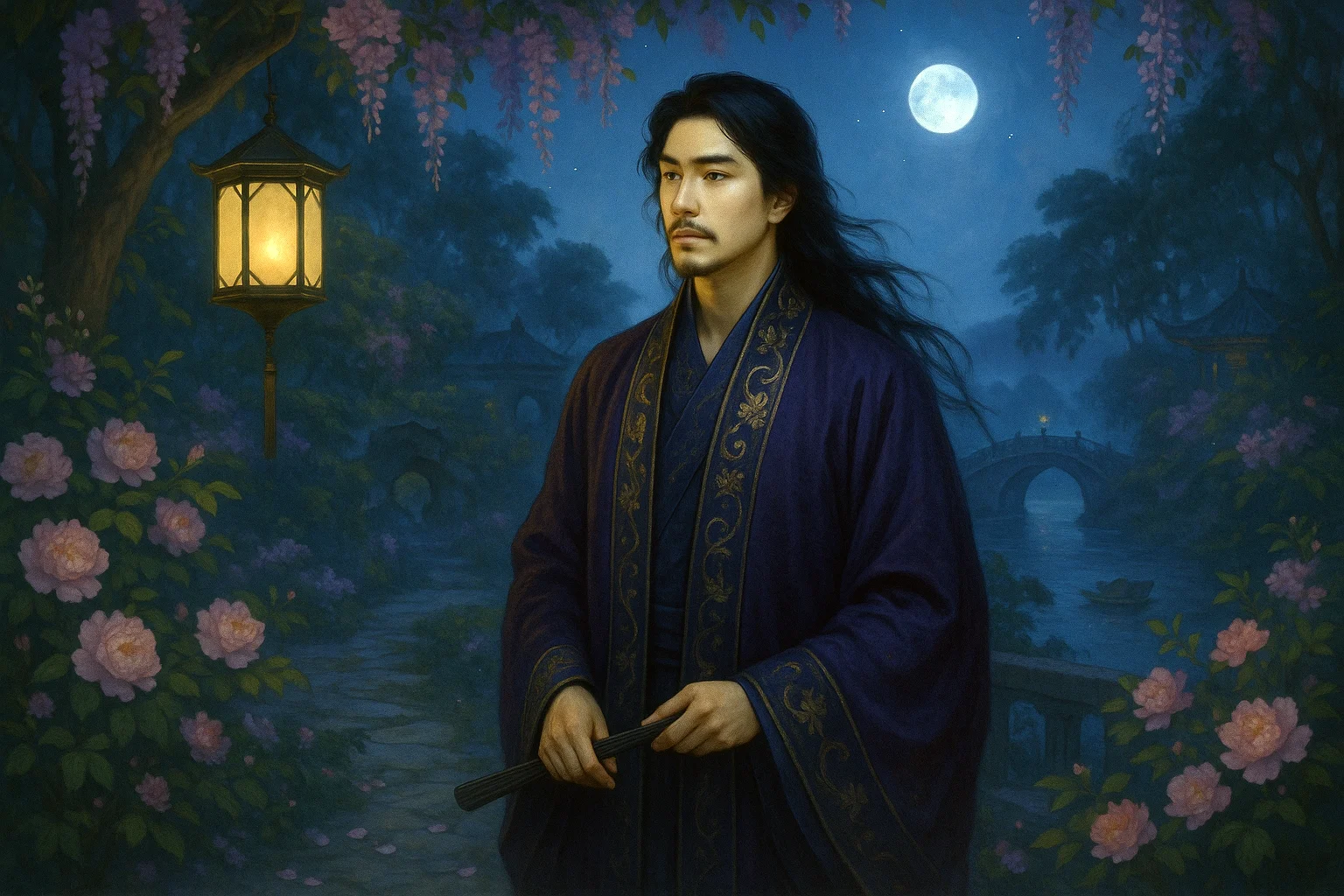
Li Shangyin (李商隐), 813 - 858 AD, was a great poet of the late Tang Dynasty. His poems were on a par with those of Du Mu, and he was known as "Little Li Du". Li Shangyin was a native of Qinyang, Jiaozuo City, Henan Province. When he was a teenager, he lost his father at the age of nine, and was called "Zheshui East and West, half a century of wandering".






